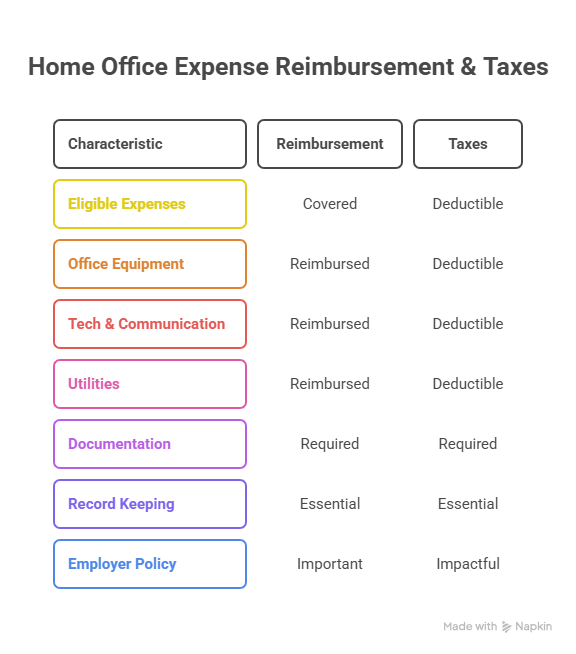Given that more than 4.7 million Americans work from home at least half the time, it is now essential for both employers and employees to comprehend the nuances of telecommuting expense guidelines.
Businesses now operate very differently as a result of the shift to remote work, so it’s critical to understand the intricacies of home office expense reimbursement.
The purpose of this guide is to clarify the items that qualify for reimbursement, the applicable limits, and the tax advantages of working from home. People can potentially lower their tax liability and better manage their work-related expenses by being aware of these factors.
It’s more crucial than ever to stay up to date on the rules governing remote work expenses as the workplace continues to change.
Understanding Home Office Expense Reimbursement Guide
Understanding home office expense reimbursement is essential for both employers and employees as remote work becomes more common. A properly designed home office expense policy guarantees legal compliance in addition to preserving a good working relationship between the employer and employees.
What Qualifies as a Home Office
In general, a home office is regarded as a specific area used for work. The area must be regularly and solely utilized for business purposes in order to be eligible. This could be a room all to itself or a particular section of a room.
Types of Remote Work Expense Policies
There are several kinds of remote work expense policies that employers can implement, such as:
- policies for reimbursement, whereby workers receive payment for the actual costs they have incurred.
- stipend policies, in which workers are paid a set sum to cover their expenses.
- Employers who implement direct payment policies cover costs like software or the internet out of pocket.
Legal Requirements for Employers
When establishing policies for the reimbursement of home office expenses, employers must adhere to legal requirements. This comprises:
| Legal Requirement | Description |
|---|---|
| Fair Labor Standards Act (FLSA) | Ensures that employees are not reimbursed below minimum wage when expenses are considered. |
| State-specific laws | Vary by state; some require employers to reimburse employees for certain expenses. |
Understanding these aspects is crucial for creating a fair and compliant home office expense reimbursement policy.
Eligible Items and Reimbursement Limits
Employees who work from home must be aware of which expenses qualify for reimbursement. This information not only aids in keeping a productive and comfortable workstation but also maximizes the financial gains made possible by employee home office reimbursement schemes.
You should become familiar with your company’s remote work expense policy because many employers have specific policies about what can be reimbursed
Essential Office Equipment and Furniture
Essential office furnishings and equipment are usually reimbursed. Computers, printers, desks, and chairs can all fall under this category. The important thing is to make sure your employer has authorized these costs and that they are required for your job.
Technology and Communication Expenses
In the current digital era, a large portion of home office expenses are related to communication and technology. This can include software required for your work, phone plans, and internet services. As part of their employee home office reimbursement programs, many employers cover these costs.
Utilities and Internet Costs
Depending on your employer’s policy, you may also be eligible for reimbursement for utilities like internet and electricity costs. It’s important to monitor these costs and determine the percentage of your utility bills that can be ascribed to your home office.
Documentation Requirements for Claims
Usually, workers must submit thorough documentation in order to submit a reimbursement claim. Purchase receipts, utility and internet service invoices, and occasionally even a record of how these costs were utilized for work-related purposes can be included in this. In addition to being helpful when thinking about tax deductions for home office expenses, maintaining accurate records is essential for a seamless reimbursement process.
Employees can maximize their benefits and successfully navigate their company’s reimbursement policy by being aware of the eligible items and keeping the right paperwork.
Tax Implications and Benefits
In order to maximize your reimbursement and minimize your tax liability, it is essential to comprehend the tax implications of home office expenses. Understanding the regulations governing work from home expense claims is crucial when submitting a claim for home office expenses.
If they meet certain requirements, employees who work from home may deduct home office expenses from their taxes. The IRS permits deductions for costs associated with a home office, including utilities, equipment, and a portion of rent or mortgage interest.
Employees must keep accurate records, such as logs and receipts, to support their claims in order to claim these expenses. Because these regulations may affect the reimbursement policies they put in place, employers can also gain from knowing them.
Employees and employers can manage the complexities of work from home expense rules and guarantee compliance with IRS regulations by being aware of the tax implications and advantages related to home office expenses.

FAQ
What expenses are eligible for reimbursement under a home office expense policy?
Typically, eligible expenses include utilities, internet costs, technology and communication costs, and necessary office furniture and equipment. Depending on the employer’s policy, different expenses may be covered.
How do I document my home office expenses for reimbursement?
Save utility bills, internet statements, and receipts for everything you buy to keep track of your spending. Keeping a record of your expenses, including the date, amount, and description of each expense, is also a smart idea.
Can I claim home office expenses on my taxes?
Yes, you can deduct home office expenses from your taxes in many situations. To find out which specific deductions you qualify for, it’s best to speak with a tax expert as the regulations governing work-from-home expenses differ.Yes, in many cases, you can claim home office expenses on your taxes. The rules governing work-from-home expenses vary, so it’s best to consult with a tax professional to determine the specific deductions you’re eligible for.
What are the tax benefits of having a home office expense reimbursement policy?
Both employees and employers may benefit tax-wise from a home office expense reimbursement policy. Employees may be able to avoid declaring the reimbursed amounts as taxable income, and employers may be able to deduct the reimbursed expenses as business expenses.
Are there any limits to home office expense reimbursement?
According to the employer’s policy and the relevant tax laws, there might be restrictions on the amount that can be reimbursed for home office expenses. For instance, there might be a maximum annual reimbursement amount or a per-diem cap on some costs.
How do I ensure I’m complying with the legal requirements for home office expense reimbursement?
Learn about the applicable tax laws and regulations, such as those pertaining to accountable plans and substantiation requirements, to guarantee compliance. To make sure your policy complies, it’s also a good idea to speak with a tax expert or lawyer.
Can I claim expenses for a dedicated home office space?
Yes, you might be able to deduct costs associated with your home office, including utilities, internet, and a portion of your rent or mortgage interest.
How do remote work expense policies vary?
Employers’ policies regarding remote work expenses can differ greatly from one another. While some companies may have more generous reimbursement policies, others might have more stringent guidelines or caps on what can be reimbursed.




